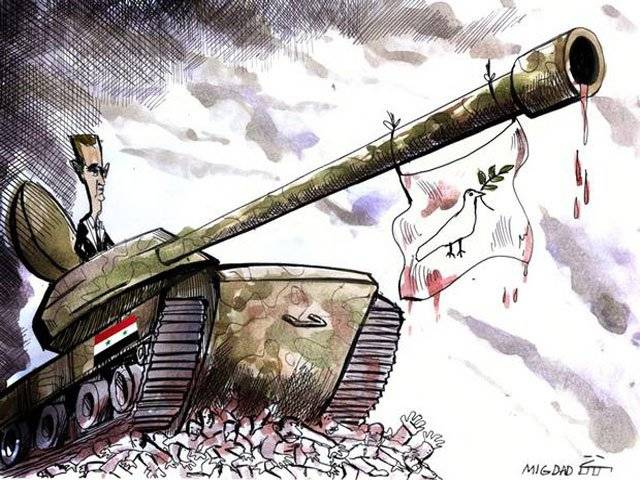Despite more than 3,000 deaths and countless arrests, mass demonstrations show no signs of letting up in Syria. And after months of protesters facing the worst violence - death squads, children being gunned down and heavy armour used against civilians - there are signs that they are beginning to arm themselves. Non-violence in the face of this regimes cruelty may be too much to ask, but an outright armed rebellion would have far-reaching consequences. Everyone understands where this can lead, and that the stakes extend beyond Syrias 22.5 million people. The US Senator John McCain has become a champion of the hawkish camp calling for international intervention, perhaps in the form of a Nato-enforced no-fly zone. The case has grown stronger as some members of the Syrian opposition have also asked for intervention. If protecting civilian lives demanded international help for Libya, why not Syria? President Bashar Al Assad responded by bluntly warning, in an interview with the Sunday Telegraph, that western intervention would burn the whole region. But Mr Al Assads power to foment trouble beyond Syrias borders is much diminished. It is no longer certain that even Hizbollah or Hamas would dance to Damascuss tune. Anything approaching civil war, however, would plainly be dangerous for the region. There is little foreseeable prospect of a decisive military intervention similar to Libya because of US and European domestic priorities. For the time being, Syria remains a regional concern. Last week, Syrian troops were reportedly sowing minefields along the Lebanese border to block arms smuggling. As this conflict worsens, Syrias neighbours, and not just Lebanon, which has always been in its neighbours shadow, will be drawn in farther. Syrias allies in Iran, and to a lesser extent Iraq, see their own regional standing at stake. Turkey is already trying to influence the opposition to limit the power of pro-PKK Kurdish groups. In a region of ethnic groups overlapping borders and complex allegiances, the question is not who will intervene in Syrias uprisings, but who will not. It is easy to imagine such meddling getting out of hand and Syria descending into a protracted low-intensity war of factions, including proxies for outside forces. This would hardly be beneficial for Syrias growing opposition movement. The end of Mr Al Assads tenure is assured; it is just a question of time and cost. Outside parties, however well-intentioned, would do better to deal in diplomacy to curb the violence rather than enter the fray. The National editorial
Tuesday, April 16, 2024
Neighbours risk turning Syria into a proxy war theatre

Decision to retaliate against Iran attacks rests with Israel, says Pentagon
1:05 PM | April 16, 2024
Global brands facing challenge from local contenders in Pakistan's FMCG market
10:24 AM | April 16, 2024
Israeli Air Force finalizes preparations for possible attack on Iran
8:21 AM | April 16, 2024
Court remands XEN in FIA custody
April 16, 2024
Political Reconciliation
April 16, 2024
Pricing Pressures
April 16, 2024
Western Hypocrisy
April 16, 2024
Policing Reforms
April 15, 2024
Storm Safety
April 15, 2024
Democratic harmony
April 16, 2024
Digital dilemma
April 16, 2024
Classroom crisis
April 16, 2024
Bridging gaps
April 16, 2024
Suicide awareness
April 15, 2024
ePaper - Nawaiwaqt
Advertisement
Nawaiwaqt Group | Copyright © 2024





